This website uses cookies
We use cookies to ensure that we give you the best experience on our website. If you continue to use this site we will assume that you are happy with it.
Jump to:
Jaclyn Kelley-Widmer, Clinical Professor of Law, Director of the 1L Immigration Law and Advocacy Clinic
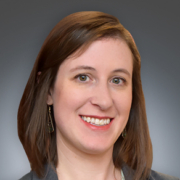
Jaclyn Kelley-Widmer
In spring 2025, the 1L Immigration Law & Advocacy Clinic has eight phenomenal first-year students working on a variety of cases for immigrants living in the Ithaca area and elsewhere. We are handling four asylum cases for local families, with each student team engaged in detailed client interviewing, legal research, brief writing, and country-conditions research. We are also providing urgent legal consultations for members of the Cornell and Ithaca community, with an especially high volume of requests during this time of heightened scrutiny of immigrant communities.
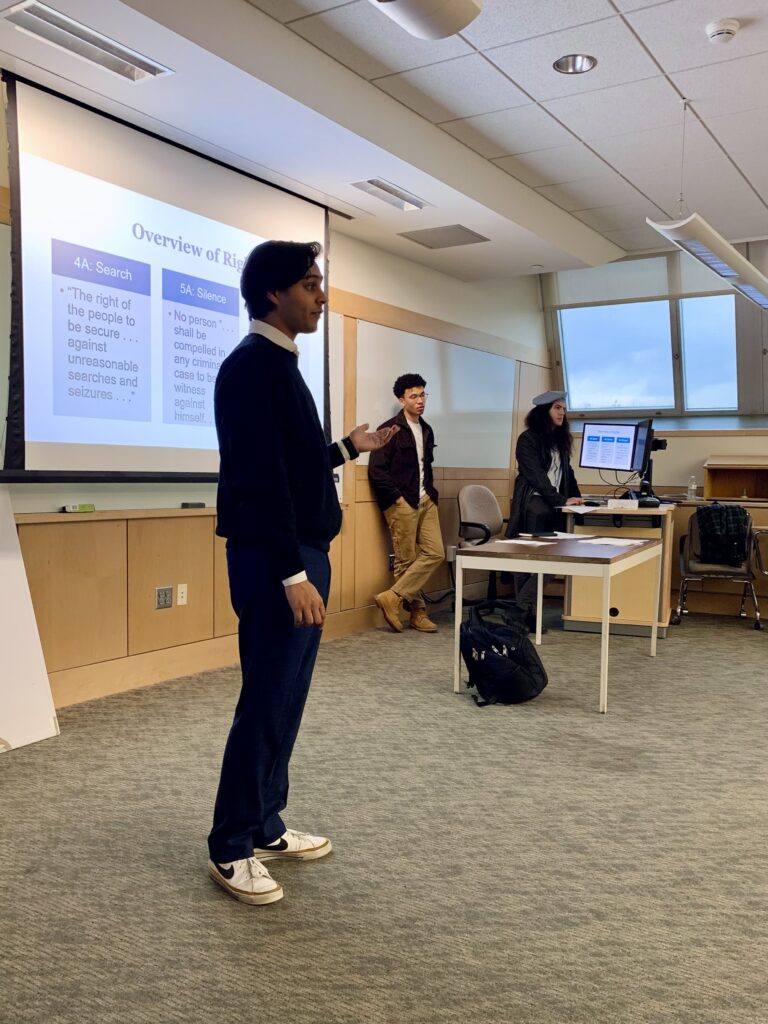
From left: Sahil Venkatesan ‘27, Josiah Jones ‘25, and Rodrigo Tojo Garcia ‘25 presented a Know Your Rights at Ithaca College on February 25.
Additionally, the 1L Immigration Law & Advocacy Clinic is coordinating an inter-clinic project to deliver informational immigration presentations in the Ithaca community and beyond. These presentations cover topics such as the basics of asylum, immigration policy updates, and Know Your Rights. Students from various clinics and law-student organizations are collaborating in this community-facing effort.
The 1L clinic continues to produce public-facing written resources such as this explainer about immigration enforcement on campus and this consular processing guide with the Path2Papers project. Further, through Path2Papers, clinic students are serving DACA clients applying for employment-based visas and conducting legal research on DACA-specific issues.
Finally, we continue to work on behalf of clients in immigration detention. Ten first-year and advanced students traveled to the Buffalo Federal Detention Facility in Batavia in March 2025, where we worked in coalition with partner attorneys from Immigration Equality, Prisoner’s Legal Services, and RFK Human Rights. We met with detained people to provide them legal information and individualized legal advice for their cases. Students were able to engage in trauma-informed interviewing, issue spotting, and analysis in a high-stakes environment.
Rachel T. Goldberg, Clinical Clinical Professor of Law (Lawyering)

Rachel Goldberg
In the spring of 2025, advanced Appellate Criminal Defense Clinic student Sarah Stevenson-Peck ’25 argued a client’s criminal appeal in front of a five-judge panel at New York’s Appellate Division, First Department. The appellate brief, drafted with clinic student Gianna Scerbo ’24, argued, in part, that the conviction was against the weight of the evidence and that the court failed to deliver a required charge to the jury. Meanwhile, current clinic students are tackling several felony appeals on behalf of incarcerated New Yorkers. In one case, they are advocating for a client convicted of manslaughter based solely on circumstantial evidence, arguing that the court’s refusal to admit evidence suggesting a third party may have committed the crime violated their client’s right to a fair trial. In another appeal, students are fighting to overturn a conviction where, at trial, the court improperly admitted irrelevant and highly prejudicial evidence of past crimes, undermining the jury’s ability to impartially assess the case.
Estelle McKee, Clinical Professor of Law (Lawyering)

Estelle McKee
This past year, the Asylum and Convention Against Torture Appellate Clinic (ACAT), with clinic alumna Alyssa Kastner ’24, other associates at Covington & Burling, and the Novo Legal firm, filed a petition for rehearing, challenging a decision by a Ninth Circuit panel limiting construction of the Convention Against Torture. The Ninth Circuit has ordered the Department of Justice to respond, and the petition is pending. This semester, clinic students filed a brief in the Board of Immigration Appeals challenging the removal of a young man to El Salvador under the Convention Against Torture. Students are also representing an Afghan family appealing an asylum denial and a Nigerian man whose family members were killed by Boko Haram, in a complex appeal addressing criminal bars, credibility, and legal issues relating to asylum and withholding of removal. The ACAT clinic is also working with Justice for Migrant Families to assist pro se litigants appealing removal orders. Lastly, due to the federal government’s conservative shift in immigration policies, the clinic is working with the 1L Immigration Advocacy Clinic and the Farmworkers Legal Assistance Clinic to provide “Know Your Rights” and immigration-law presentations to the local community.
Katrina Nobles, Director of Conflict Programs, Scheinman Institute
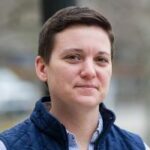
Katrina Nobles
Both the Campus Mediation Practicum I and the Campus Mediation Practicum II have added additional community partners to expand the opportunities for students to observe and mediate cases. Our new community partners include the Tompkins Country Community Dispute Resolution Center, the Ithaca City Small Claims Court, and the Montana Mediation program. Students still have the opportunity to apply skills to student conduct cases here on campus, while also being able to participate in expanded case types, such as civil, community, and small claims cases with our community partners.
Ellen Eagen, Adjunct Professor of Law

Ellen Eagen
This spring the Education Law Practicum (ELP), in its fourth year, continues to engage in research, advocacy, and litigation on critical education law issues, in furtherance of our mission of advancing educational equity and access and using the legal framework to reimagine K-12 education.
Through in-depth research and discussions with leading experts, we have explored the evolving landscape of education policy, particularly in response to the current administration’s executive orders affecting DEI initiatives, school funding, and the status of related federal agencies. These conversations provide students with an understanding of the legal and policy shifts shaping education today and those on the horizon, while informing us on how we counsel our clients, which includes students, parents, school leaders, and administrators from independent public charters and private schools.
This semester our advocacy efforts have yielded tangible results. We successfully secured an extension of eligibility for a fifth-year high school student to play varsity basketball after an appeal before Section 3 of New York State Public High School Athletic Association (NYSPHSAA). Additionally, through the State Complaint (34 CFR Part 300) administrative process under the Individuals with Disabilities Act (IDEA), the practicum obtained eight months of compensatory services for two young men who had IEPs and who had graduated from an Upstate New York school district, reinforcing the importance of accountability in special education services. The practicum is currently working to obtain compensatory funding for the same family in a due process hearing under IDEA, working closely with the clients to craft a meaningful remedy. The practicum is also on the verge of pursuing a federal claim on behalf of a student who faced discrimination as a member of a private independent high school ice hockey team. This case underscores the practicum’s commitment to combating inequity in all educational settings, including private institutions where students’ rights can be overlooked.
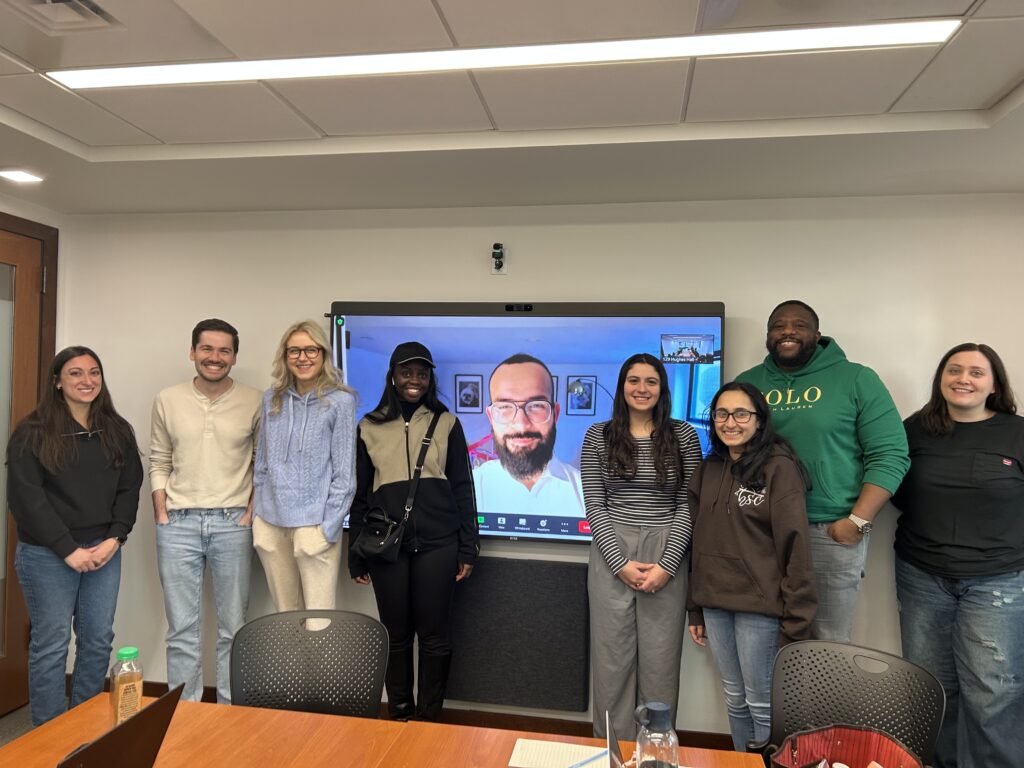
Harold Solis, center on screen spoke with the practicum this semester.
Harold Solis spoke to the practicum on the current climate for noncitizens without legal status in the educational setting in New York City. Solis is the legal director of Make the Road New York, a nonprofit membership organization advocating for immigrants and working-class communities through an innovative approach integrating grassroots activism with direct support services.
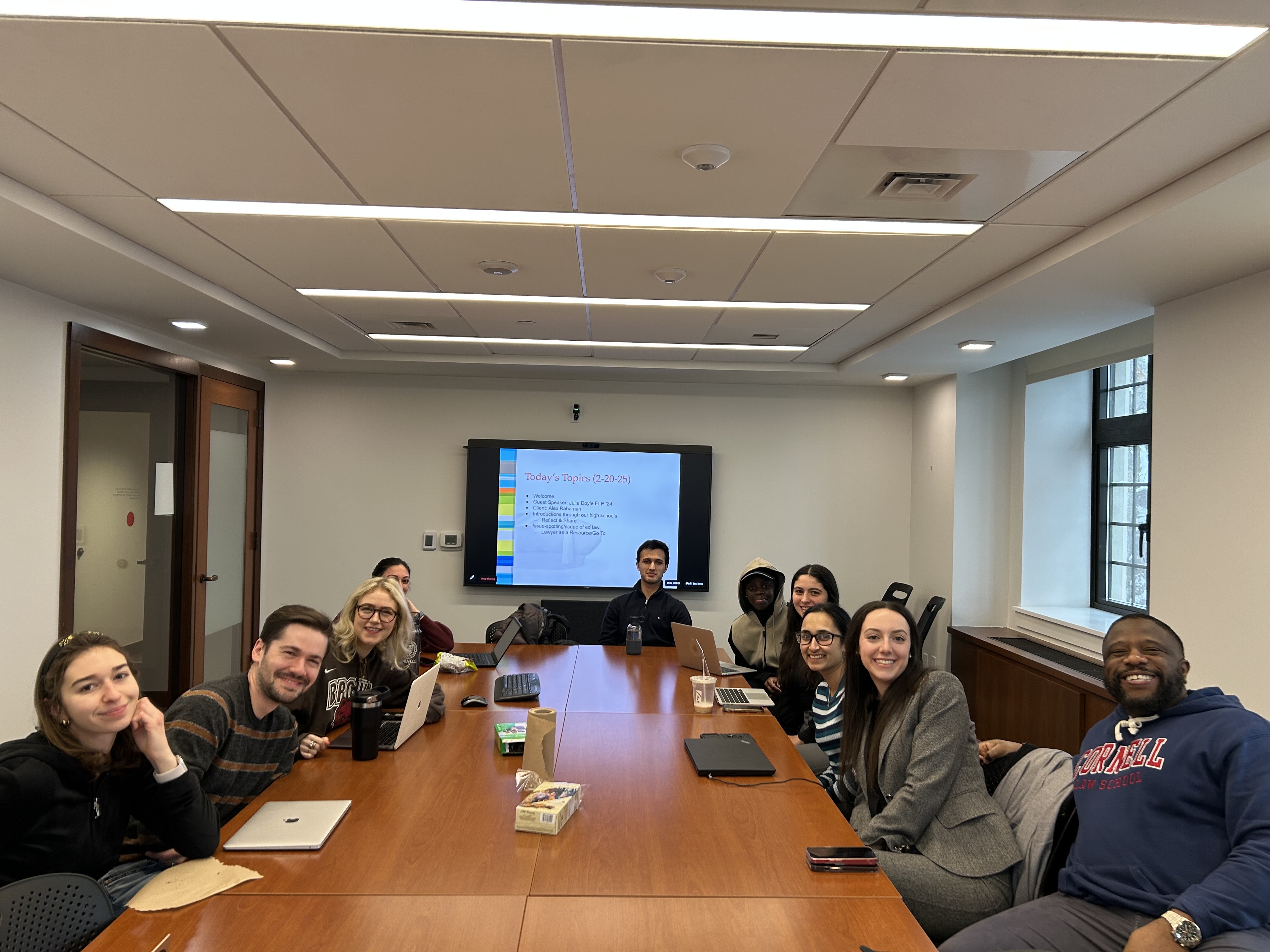
Also this semester, Julia Doyle ’24, a practicum alum, spoke about the positive impact of her clinical experience on her current role as a junior associate in a law firm in New York City.
Celia Bigoness, Clinical Professor of Law and Director of the Blassberg-Rice Center for Entrepreneurship Law
David J. Reiss, Clinical Professor of Law and Research Director of the Blassberg-Rice Center on Entrepreneurship Law, Cornell Tech
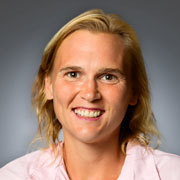
Celia Bigoness

David J. Reiss
The Blassberg-Rice Center for Entrepreneurship Law at Cornell Tech in New York City welcomed its inaugural class this semester! The center and the Entrepreneurship Law Clinic work with entrepreneurs affiliated with Cornell Tech and with organizations throughout the city, such as the Queens Chamber of Commerce. Law students help entrepreneurs with business entity selection and formation, equity allocation among founders and early hires, hiring and employment matters, and intellectual property protection. Among other clients, clinic students are working with social entrepreneurs, including one that has released an AI-powered chatbot that helps tenants navigate their relationships with their landlords.
Jill Miller, Adjunct Professor of Law
Kathryn Grant Madigan, Adjunct Professor of Law
Amanda Giannone, Adjunct Professor of Law

Jill Miller
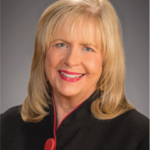
Kate Madigan
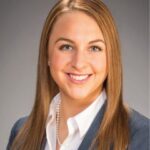
Amanda Giannone
Each year, the Estate Planning Practicum hosts “Law Day,” bringing our law students together for a whirlwind day in Manhattan where they engage with a wide variety of judges and lawyers, learning about the many pathways experienced lawyers have taken before finally “landing” in their career of choice.
We started the day at New York County Surrogate’s Court in lower Manhattan, the highest volume probate court in the U.S. We were greeted by Surrogate Judge Mella and her law clerks who discussed the origins of Surrogates Courts in New York, which were established in 1787. The students then attended Surrogate Judge Gingold’s Calendar Call, which was handled by her Principal Law Clerk Lisa Barbieri, in which various probate and administration litigants appeared, including a few pro se individuals.

Annual Law Day trip to New York City.
Staci Graber from the Public Administrator’s Office, who has been a tour guide for our Cornell Law students for many years, introduced the group to the Public Administrator (PA), her Deputy, and the office staff. Our tour included detailed explanations of how a PA is appointed and the role of the office in the administration of estates, large and small, when no family members are available to serve as fiduciary. The students toured the record room, which holds many celebrity wWills, including those of Jacqueline Onassis, Marilyn Monroe, and others.
We then took the subway back to mid-town for a lunch hosted by the trust and estate attorneys at Fiduciary Trust, in which the students learned from each of the five lawyers how their unique career paths brought them to where they are today.
Next stop was Christie’s Auction House, where we met the general counsel and staff who also shared their paths to Christie’s. We enjoyed a tour of the Selling Room, the vault that holds the artwork prior to sale, including a Warhol print, Birken handbags, and high-end watches.
Each year Professor Miller invites judges and practitioners to a family style dinner in which the students move from table to table to engage with each of our guests. This year’s guests included Surrogate Gingold; NYS Supreme Court Justice Crane; and US Bankruptcy Judge Beckerman. Among the attorneys who joined us included a personal injury plaintiffs lawyer, Richard Abend; fiduciary litigator Laurence Lebowitz; Angelo Grasso, current chair of the NYSBA T&E Section; Glenn Fox, former chair of NYSBA International Section and estate planner; Elder Law and T&E lawyer, Ellyn Kravitz; and an art law practitioner, Samantha Anderson at Patterson Belknap Webb & Tyler.
Kudos to professors Miller, Giannone, and Madigan and teaching assistants Sarah Emily Abec and Jonathan Renert for arranging such an eye-opening, formative experience for the Estate Planning Practicum students.
Amanda L. Giannone is a death doula and partner at Levene Gouldin & Thompson, LLP. Her law practice focuses primarily on long-term care and Medicaid planning, guardianships, estate planning and administration, and real estate. In 2023, Giannone was appointed to the New York State Bar Association’s Task Force on Medical Aid in Dying. She serves on the governing bodies of several non-profit organizations, including Action for Older Persons and Mercy House of the Southern Tier. An important facet of Giannone’s practice is helping individuals navigate end-of-life planning and decision-making with clarity and peace of mind. She frequently presents and lectures to the public to make estate and long-term care planning more approachable.
Beth Lyon, Associate Dean for Experiential Education, Clinical Professor of Law, and Clinical Program Director
Tasha Gottschalk-Fielding, IJC Legal Fellow

Beth Lyon

Tasha Gottschalk-Fielding
The Farmworker Legal Assistance Clinic continued its focus on representing child and youth farmworkers in deportation proceedings and in state courts, while working with clients impacted by the family separation policy, labor trafficking, and the H-2A temporary foreign worker program. Recently we appeared in Cayuga and Oswego County courts, receiving orders placing our clients on a path to permanent immigration status. Several students are working in the cross-clinic rapid response team providing safety planning and presentations to local communities affected by the punitive turn in U.S. immigration enforcement policy. In October 2024, the clinic submitted an intervention to the U.N. entitled “Implementing Farmworker Protections Under the Declaration: Crispin Hernández, Institute for Migrant Rights, and Cornell Law School Farmworker Legal Assistance Clinic Submission to the Working Group on the rights of peasants and other people working in rural areas on the dissemination and implementation of the United Nations Declaration on the rights of peasants and other people working in rural areas (“UNDROP”).” The submission argued that laws excluding farmworkers from worker protections and policies failing to monitor farmworker worksites contravene the Declaration.
The clinic also continued its outreach through its Mohawk Valley Region Immigration Assistance Project, which focuses on providing representation for Special Immigrant Juvenile (SIJ) cases in previously underserved counties in the eastern part of Upstate New York. Through this project, we recently filed the clinic’s first cases in Herkimer and Greene County courts. The clinic has also begun collaborating with multiple New York City law firms, including Selendy Gay PLLC and Proskauer Rose LLP, to connect and mentor their pro bono departments with SIJ cases in the Mohawk Valley Region.
Mark Jackson, Director of the First Amendment Clinic and Adjunct Professor of Law
Heather Murray, Associate Director and Managing Attorney, Local Journalism Project
Michael Grygiel, Adjunct Professor of Law
Michael Linhorst, Local Journalism Attorney (not pictured)
Daniela del Rosario Wertheimer, Stanton Fellow

Mark Jackson

Heather Murray

Michael Grygiel

Michael Linhorst

Daniela del Rosario Wertheimer
The First Amendment Clinic secured significant victories for clients in recent months, filed an important lawsuit challenging a book censorship law, and provided several students and alumni with opportunities to both argue and take testimony in state and federal courts.
In February, a federal judge in the Northern District of New York sided with Catskills-based newspaper The Reporter in denying Delaware County Defendants’ effort to dismiss claims that they violated the paper’s First Amendment rights in retaliation for critical coverage. The ruling underscores that blanket bans on government employees talking to journalists or demands that they not communicate with journalists without pre-clearance from supervisors run afoul of the First Amendment. In that same case, clinic students Alex Venditti ’25 and Celina Rivernider ’26 took expert and witness testimony during a five-hour evidentiary hearing in January. Venditti and Evan Deakin ’25 represented the client at a second hearing in February, where the clinic negotiated a stipulation resolving all discovery disputes to date.
Also in February, the clinic filed a groundbreaking lawsuit in federal court in Idaho against the Idaho attorney general, county prosecutors, and others challenging the state’s law restricting public and school libraries from making constitutionally protected literary works available to minors. Under the law, classics like Kurt Vonnegut’s Slaughterhouse-Five and Toni Morrison’s The Bluest Eye have been stripped from bookshelves, alongside award-winning young adult best-sellers like Stephen Chbosky’s The Perks of Being A Wallflower. Clinic students Paul Janes ’26, Rivernider, and Alex Strohl ’25 contributed to the complaint.
In January, the Clinic secured access a second time for scholar and journalist Arun Kundnani to interview the incarcerated civil rights leader Jamil Al-Amin, formerly H. Rap Brown, for a book on his life. Clinic students Venditti and Sierra Berry ’26 alongside co-counsel at Arizona State University’s First Amendment Clinic worked on this effort.
Clinic alumnus Patrick George ’24 argued before the Appellate Division, Second Department in a libel case that same month. The clinic represents an activist who was sued for defamation after speaking about matters of public concern, including race relations and municipal contracts.
In recent months, the clinic has also filed amicus briefs in student speech and court access matters, filed briefs opposing efforts to withhold bodycam footage and to improperly delay responding to public records requests, fully briefed an appeal seeking access to settlement records, filed four demand letters, and provided pre-publication review, trainings and transactional advice to clients.
Elizabeth Brundige, Clinical Professor of Law
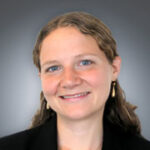
Elizabeth Brundige
The Gender Justice Clinic celebrated its 10th year anniversary this fall. Clinic alumni reflected on the clinic’s first decade, while current students contributed to planning for its future.
The clinic has continued representing gender justice activists, survivors of gender-based violence, and family members of activists and survivors in their applications for asylum and other immigration matters. In recent months, the clinic supported ten clients in applying for work authorization and helped four clients obtain temporary protection status.
This semester, the clinic is working with other civil society organizations and clinics in preparing submissions to the UN Human Rights Council to inform the council’s upcoming Universal Periodic Review (UPR) of the United States. The UPR is a process through which UN Member States review the human rights record of other states and make recommendations for reform. The clinic’s work focuses on issues of military sexual assault and discrimination; human trafficking and discrimination against people in the sex industries, and rights violations against LGBTQ+ individuals in the areas of health, education and housing.
In fall 2024, the clinic supported LEGABIBO, the leading LGBTQ+ rights organization in Botswana, in submitting a shadow report to the UN Committee on the Elimination of Discrimination Against Women. The report highlighted areas in which LGBTQ+ Batswana continue to face grave violations of their human rights, notwithstanding a judicial decision that decriminalized same-sex sexual relations. The committee’s subsequent List of Issues Prior to Reporting, which will frame its upcoming review of Botswana’s compliance with the CEDAW treaty, called upon Botswana to provide information about many of the human rights issues the clinic and its partners had identified.
Clinic students have also contributed to community education and engagement. In November, the clinic organized and cohosted “Justice on the Brink: Thailand’s Struggle for Human Rights and Democracy,” an event with Sirikan Charoensiri, the executive advisor at Thai Lawyers for Human Rights. In February, clinic students and faculty participated in an event for the law school community on reproductive justice and family planning, hosted by If/When/How: Lawyering for Reproductive Justice. In March, clinic students led a workshop for Ithaca High School students on human rights law, language, or strategies to advance gender justice. Other ongoing clinic projects include the development of a handbook on anti-gender-based violence law for lawyers and judicial officers in Zambia and support for a sex-worker-led research project on financial discrimination against people in the sex trades.
Sandra Babcock, Clinical Professor of Law

Sandra Babcock
On January 21, the U.S. Supreme Court held in the case of clinic client Brenda Andrew that the prosecution’s irrelevant invocation of Ms. Andrew’s sex life may have undermined the fairness of her capital murder trial. In a 7-2 decision, the court remanded Andrew’s case to the Tenth Circuit for de novo review of the harm engendered by the prosecution’s tactics. Andrew v. White marks the first time that the Supreme Court has commented on gender bias in a criminal case—and we hope that it will result in new trials for incarcerated women around the country. Together with Professor Babcock, clinic students began working on Andrew’s case five years ago, conducting an analysis of the gender bias in her case, advising the defense team how to best present that evidence, marshalling amicus briefs, and filing a petition to the Inter-American Commission on Human Rights on her behalf. One of the clinic’s former students, Nathalie Greenfield ’21, joined Andrew’s legal team two years after graduating from Cornell. We are thrilled for Brenda Andrew and hopeful she will one day receive a new trial free from gender stereotypes. Read more about the case here.
In fall 2024, the International Human Rights Clinic supported the Pan African Lawyers’ Union (PALU) in filing the first challenge to the death penalty before the African Court on Human and Peoples’ Rights. PALU presented a request for an advisory opinion on whether the death penalty violates the African Charter on Human and Peoples’ Rights as well as other human rights treaties. Clinic students conducted research and wrote legal memos that were ultimately incorporated into the pleading filed with the court. Now they are supporting a coalition of African organizations who are seeking to intervene in the case, arguing that the death penalty is arbitrary and discriminatory in its application.
Esha Sraboni has joined the Cornell Center on the Death Penalty Worldwide as a research fellow examining gender bias in women’s capital cases. Esha’s research lies at the intersection of gender, law, science, inequality, and human rights in global contexts. She focuses on the formulation of law and policy, examining their impact on targeted communities while exploring the global and local systems of inequality in which they are embedded. Her current book project investigates legal reforms around sexual violence investigation and adjudication in Bangladesh. She has published in World Development, Development Policy Review, Food Policy, Asia-Pacific Sustainable Development Journal, and the Bangladesh Journal of Development Studies. Her work has also been used by donor communities and policy research organizations to inform the design and implementation of public social welfare initiatives in South Asia and Sub-Saharan Africa. Esha received her PhD in Sociology with a certificate in gender and sexuality studies from Brown University.
Angela Cornell, Clinical Professor of Law

Angela Cornell
Students in the Labor Law Clinic have spent their time representing clients with a range of traditional labor and employment law matters. We had two employment discrimination claims last semester; one before the Equal Employment Opportunity Commission (EEOC) and the other before the Human Rights Division. Students mediated the race and gender claim on behalf of a local woman, reaching a good settlement in the EEOC mediation. The Division of Human Rights found probable cause on the sexual harassment claim involving a low-wage worker, and students have been negotiating with the respondents in that case. Also pending is a related retaliation claim. If it does not settle, a hearing will go forward before an administrative law judge.
On our labor cases, we prevailed partially on an unfair labor practice charge alleging bargaining violations before the National Labor Relations Board. We also advised a client on non-board union elections and the misclassification of workers as well as related issues. Area farmworkers requested a Know Your Rights presentation on the Farmworkers Fair Practices Act, which provides agricultural workers the right to organize collectively, along with other protections.
We prevailed on an arbitration case involving a young worker who was fired two weeks after breaking his tibia. He was on short term disability when he was terminated. The arbitrator ruled that the worker’s termination violated just cause and ordered reinstatement. Students handled the entire evidentiary hearing, doing the opening, direct, and cross examinations as well as writing the post-arbitration brief.
On behalf of an international client, students researched and wrote a report on violations of freedom of association and assembly in Peru that will be submitted through the UPR process and oversight of treaty compliance with the International Covenant on Economic Social and Cultural Rights.
Beth Lyon, Associate Dean for Experiential Education, Clinical Professor of Law, and Clinical Program Director
Madeline Garcia Bigelow, Adjunct Professor of Law, Associate Director of the Urban Justice Center and Managing Director of its Domestic Violence Project (not pictured)

Beth Lyon
The Law-Med Case Collaboration at Cornell University is an interdisciplinary initiative developed in partnership with Weill Cornell Medicine’s Center for Human Rights (WCCHR). This collaboration integrates legal and medical expertise to provide comprehensive support for clients navigating complex legal, medical, and social challenges. By bringing together law students, medical professionals, and faculty mentors, the program fosters a multidisciplinary approach to advocacy.
We ran the pilot course in fall 2024 and spring 2025 with a dedicated cohort of students committed to providing critical support for their clients. WCCHR referred clients from its forensic asylum support program, and the law students, supervised by Professors Madeline García Bigelow and Beth Lyon, served as legal navigators. The law students interviewed and counseled the clients, identifying and counseling them on a range of legal and other urgent concerns. Both the medical school and the law school view the pilot program as a success and plan to run the course again in the fall.
We are excited to welcome Madeline Garcia Bigelow to the Clinical Program faculty. Garcia Bigelow has been providing invaluable guidance and expertise to support the case collaboration component of the program.
Garcia Bigelow is the associate director of the Urban Justice Center and managing director of its Domestic Violence Project (DVP), where she leads a dedicated team providing holistic legal and advocacy services to survivors of intimate partner violence. Prior to this role, she served as codirector of Sanctuary for Families’ Bronx office, where she litigated family offense matters and supervised staff. Garcia Bigelow also spent six years at the Bronx District Attorney’s Office, working in the Domestic Violence/Sex Crimes Bureau as an assistant district attorney and later as acting supervisor. Her approach to advocacy emphasizes emotional intelligence and a survivor-centered legal strategy, ensuring clients receive both validation and robust representation. We are grateful for her contributions to our program and the invaluable insights she brings to our students.
Julia Mizutani, Law Research, Instruction, and Liaison Librarian; Adjunct Professor of Law
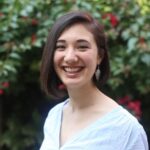
Julia Mizutani
Spring 2025 has required a lot of flexibility and patience as Cornell Law students in the Prison Education Practicum have had to reckon with and navigate the complex political, economic, racial, and social dynamics that make up the prison landscape in New York State.
In December 2024, Robert Brooks was brutally beaten by numerous corrections officers in Marcy Correctional Facility, about two hours away from Cornell. He later died from his injuries. The body camera footage was made public in late December, and New York state lawmakers responded with various proposals for reform and a call to fire and criminally charge over a dozen corrections officers involved in the beating.
In the backdrop of these events, starting in January 2025, nine Cornell Law students began teaching classes such as Civil Procedure, Family Law, and Paralegal Studies, and facilitating two debate clubs in Auburn, Five Points, and Cayuga Correctional Facilities. Four weeks into the semester, thousands of corrections officers in nearly all of New York State’s forty-two prisons began walking out of work and refusing to show up to their shifts to voice their opposition to the Humane Alternatives to Long-Term Solitary Confinement Act (HALT Act), which limits the discretionary use of solitary confinement applied to the young, the elderly, pregnant and postpartum individuals, and individuals with disabilities and chronic mental illnesses. Correction officers also demanded solutions to staffing shortages and mandatory overtime. The illegal work stoppage was not authorized by their union, and although Governor Kathy Hochul negotiated and made offers on many of the demands, including suspending the HALT Act for 90 days, corrections officers refused to show up to their shifts unless the legislature agreed to repeal the HALT Act entirely. The unrest by the corrections officers began the same week that multiple corrections officers were indicted on murder charges for the death of Robert Brooks. Most people incarcerated in New York have been forced into lockdown, where they have limited movement, limited food, less access to medication, no visitation from family or lawyers, and, of course, no college classes.
Cornell Law students have continued to show resilience and care for their incarcerated students during this tumultuous time and have been working with Cornell Prison Education Program coordinators to reschedule make-up classes and possibly continue teaching past finals and graduation to accommodate the needs of their incarcerated students. During weekly seminar classes, law students have discussed the intersecting issues impacting this particular moment in history, including the Attica Prison uprising, prison labor economy, prison geography and its relation to class and race, and many other topics.
William Niebel, Managing Attorney, Tenants Advocacy Attorney and Adjunct Professor of Law
Kathryn Krause Wozer, Tenants Advocacy Staff Attorney and Adjunct Professor of Law (not pictured)

William Niebel
The Tenants Advocacy Practicum continues to expand its horizons as a beacon for housing justice in upstate New York. Staff attorney Kathryn Krause Wozer is now an adjunct professor, teaching the practicum for the first time this semester. Managing attorney William Niebel, who taught the practicum from 2020–24, is nearing completion of his new treatise on New York residential landlord-tenant law, forthcoming later this year.
This semester, eighteen student-attorneys are currently advising or representing fifty-nine tenants and have closed seventy-two cases so far. Last semester, student-attorney Selina Xu ’26 successfully defended clients with an ownership interest in their home against eviction in Campbell Town Court, obtaining a dismissal of the case. Another student-attorney, Jeffrey Cheng ’26, appealed an eviction to Allegany County Court and orally argued for a stay during the pendency of the appeal, which was granted. Ultimately, the practicum won the appeal, confirming a tenant’s statutory right to an adjournment.
The broader Tenants Advocacy Program is innovating its right-to-counsel mission and bridging gaps in legal aid through emerging technologies and leveraging driven student-attorneys. Expected to launch publicly later this semester, a new AI tool for tenants’ rights is in final stages of testing by practicum students and Pro Bono Legal Fellow Driston Galvao ’23 in collaboration with the legal automation startup company Josef.
To date, the program has received over 1,800 intakes from tenants seeking legal advice. To assist all these clients, the program has continued recruiting students outside the practicum. A record thirty-five law students applied to volunteer this past fall and winter, helping to clear the waitlist of tenants needing legal advice—a rare occurrence! This semester, twenty-two law students continue to volunteer. Five undergraduate student volunteers managed the program’s hotline last fall, and eleven are joining the program this semester to assist in other areas.
Other additions to the team include full-time coordinator Francheska (Frankie) Reed ’24 and Pro Bono Scholar Jeong Yeon (Jane) Lee ’25. Building upon his involvement as a summer intern and practicum student-attorney in the past year, Jeffrey Cheng ’26 will take more eviction defense casework as an extern this spring. And, hiring is underway for a full-time Tenants Advocacy Fellow and eight summer interns to support the program’s eviction defense project in Rochester. This is made possible by additional funding from the New York State Office of Temporary and Disability Assistance (OTDA) through a subcontract with Legal Assistance of Western New York (LawNY).
Francheska “Frankie” Reed ’24 is the Tenants Advocacy and Veterans Law Coordinator at Cornell Law School. Frankie began her career with the Tenants Advocacy Program part-time in 2021 as an undergraduate intake volunteer for the hotline, was promoted to a paid role as case coordinator and operations manager in 2023, then transitioned to her full-time role as program coordinator for both Tenants Advocacy and Veterans Law in 2025. Over the years, she has filed, assigned, and managed over 900 cases, advised and referred clients, observed court proceedings, generated grant reports, automated intake processing, and so on. In addition to working at Cornell Law, Frankie previously interned with the U.S. Department of Housing and Urban Development and completed a joint fellowship with the U.S.-Asia Institute and Philippine Embassy. She is passionate about housing justice, community development, and alleviating poverty. Frankie holds a bachelor’s degree in architecture with a minor in law and society from Cornell University, and has completed coursework in housing and urban policy, tenants’ advocacy, disability law, and immigration law. Outside work, she enjoys art, music, chess, and taekwondo. Frankie plans on applying to law school in the future.
Ian Kysel, Associate Clinical Professor of Law

Ian Kysel
Students in the Transnational Disputes Clinic continue to have an active docket of matters in international investment law and refugee rights cases. This term, a team of clinic students (Tedrick Au ’25; Nithika Arunkumar ’26; Courtney Bell JD/LLM ’26; Meghan Brady-Fuchsman ’26; Kate Shavrova, Exchange ’25) filed a lawsuit against the Republic of Panama at the Inter-American Commission on Human Rights, along with a request for emergency precautionary measures, in an effort to prevent the expulsion and remedy rights violations of asylum-seekers and other migrants from Panama. The group had earlier been summarily expelled from the United States. The clinic is also preparing several amicus briefs addressing public interest matters for filing in international investor state arbitration proceedings.
James Hardwick, Supervising Attorney and Adjunct Professor of Law
Danielle Bernard, Adjunct Professor of Law (not pictured)
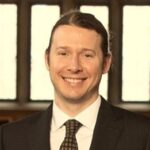
James Hardwick
The Veterans Law Practicum continues to expand its work serving veterans from upstate New York and across the U.S., including advice, brief service, and full-scope representation in a range of civil and administrative matters.
Clinic students Morgan Landers ’25, Eric Gregory ’25, Nicholas Pantazopoulos ’25, Jacob Gustafson ’25, Dylan Ceballos ’25, Iain Richards ’25, Jesse Gervasio ’25, Eric Bohrer ’26, Gabby Delp ’26, and Riccardo Silvestri LLM ’25, have reviewed thousands of pages of military and medical records and are currently drafting federal appellate briefs related to VA service-connected disability claims.
Clinic students Jade Ovadia ’25, Michelle Brodsky ’25, Krystjana Dlutowski ’25, Leah Peretsky ’26, Victoria Robertson ’26, Jasmine Crain ’26, Anna Brecher ’26, and Sammie Lambourne CBPP ’25 are currently preparing applications for discharge upgrades related to behavioral and mental health and substance abuse, including women veterans who are survivors of military sexual trauma. Clinic students have interviewed clients, family members, and fellow veterans and performed extensive research into these very fact-intensive cases involving highly technical legal arguments.
The practicum is also hosting a full-time extern, Courtney Culhane, who is a 3L at Villanova School of Law and Cornell ROTC undergraduate alumna. Courtney brings her Marine Corps background and passion for veterans’ law in service of several practicum clients seeking discharge upgrades.
Students continue to address unmet civil legal needs of unhoused and at-risk veterans in upstate New York. Jacques Bettig ’25 is assisting an elderly veteran living on a fixed income to modify a child support order in Florida currently the subject of benefits garnishment.
The practicum also accepted two Pro Bono Scholars: Elizabeth Mao ’25 and Tyler Dixon ’25. Elizabeth and Tyler are returning students to the practicum who will work on various projects, including drafting an amicus brief in support of an en banc petition to the Federal Circuit in addition to their case work. Elizabeth and Tyler will also support the practicum’s partnerships with county veterans service officers in Tompkins and Schuyler Counties to offer free legal advice clinics in March and April.
Finally, Professor Hardwick and former student Isaac Belenkiy ’24 were recently awarded the Red Cross Real Heroes Award for the work securing the release of a veteran’s service dog who was wrongfully seized and abused by a dog control officer in Steuben County.
The practicum recently recruited a Veterans Law Fellow to expand our capacity to represent veterans. Anita O’Daniel is a U.S. Air Force veteran, policy advocate, and legal scholar dedicated to advancing veterans’ rights through law and policy. She has been a leader in both local and national veteran spaces, advocating for systemic reforms that enhance access to justice and essential resources for military-connected individuals.
Anita recently completed her JD at the University of Tulsa College of Law, where she focused on veterans’ law, policy development, and legislative advocacy. Through her leadership in Student Veterans of America and her role in spearheading local initiatives, she has strengthened veteran support networks at both the grassroots and national levels. Her work has centered on improving legal protections for veterans, expanding access to benefits, and addressing policy gaps that impact military families.
With a background in education, nonprofit leadership, and legal advocacy, Anita brings a multidisciplinary approach to veterans’ law. She has collaborated with policymakers, legal professionals, and veterans’ organizations to drive meaningful change. As a Post-Doctoral Fellow at Cornell University, she looks forward to contributing to scholarship, advocacy, and policy initiatives that advance justice for veterans.